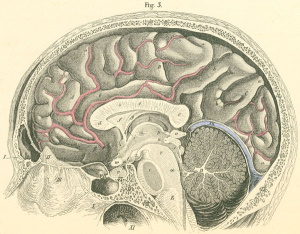 Many important advances in understanding brain diseases have been made by studying the brains of those affected. While imaging studies (MRIs and other types of brain scans) can give us important information about the brain during life, the examination of the brain tissue down the microscope after death can give us even more valuable information. In particular, we can find out how abnormal proteins, such as chorein in chorea-acanthocytosis (ChAc) and XK in McLeod syndrome, affect brain cells, what parts of the brain, which cells are most affected, and how brain chemistry changes. These sorts of studies have led to major progress in brain diseases such as Parkinson’s and Alzheimer’s diseases, and are crucial in NA. This is a way YOU can make an invaluable contribution to all those who suffer from NA, now and in the future.
Many important advances in understanding brain diseases have been made by studying the brains of those affected. While imaging studies (MRIs and other types of brain scans) can give us important information about the brain during life, the examination of the brain tissue down the microscope after death can give us even more valuable information. In particular, we can find out how abnormal proteins, such as chorein in chorea-acanthocytosis (ChAc) and XK in McLeod syndrome, affect brain cells, what parts of the brain, which cells are most affected, and how brain chemistry changes. These sorts of studies have led to major progress in brain diseases such as Parkinson’s and Alzheimer’s diseases, and are crucial in NA. This is a way YOU can make an invaluable contribution to all those who suffer from NA, now and in the future.
Deciding to be brain donor is a personal decision that must be shaped by your feelings. This may be a difficult issue to consider, especially if you are trying to stay positive, and might be hard to discuss with those close to you. However, it might give you comfort to know that the search for medical knowledge will carry on, helped in no small part by your decision.
Glenn Irvine, one of the co-founders of Advocacy for Neuroacanthocytosis Patients donated his brain when he died in 2015. He carried one copy of the abnormal gene for chorein, although this did not give him any neurological problems. It will be fascinating to see if we find any changes in his brain as a result of this mutation.
How it works
If you decide that this is something that you would like to do, it is important to convey this decision to those involved in your care (specifically your close family members), and your physician. It is helpful to be evaluated periodically from time to time by your physician so that we can correlate your physical state with how your brain looks after death.
The neuropathology team at Mount Sinai in New York, led by Dr. John Crary is evaluating the brains of those affected by NA syndromes and those who are carriers of the genes. Regardless of where you live, if you wish to make this valuable donation, we will work with your local doctors to carry out your wishes. It is critical to make arrangements ahead of time, if at all possible, as brain tissue starts to change within minutes after death. While you are in good health you can fill out an “anatomical gift” form which clearly states your wishes, and your next-of-kin can sign the “autopsy permission” form, and send these to us. Having these forms on file ahead of time will help avoid delays when the time comes. The Advocacy for NA Patients can assist with transportation costs if necessary.
Frequently asked questions
Who can donate?
We encourage everyone to donate regardless of disease status. People who are unaffected are particularly important for comparison studies. Please reach out to us if you have questions.
Does it cost anything?
There is no cost to you for participation. Funeral arrangements will need to be made separately and your funeral home will need to pick up the body.
Will it affect my medical care?
No. Deciding to be a donor will never affect your care. But being part of this study will NOT impact your medical treatments, and may offer a sense of giving back hope to the NA community.
Will there be any disfigurement?
No. Being a donor will not prevent or delay the funeral service, either open or closed casket, cremation or burial.
Can I restrict the donation?
Yes. While NA affects the muscles, peripheral nerves, and other body tissues, the brain is the most important organ for us to examine, and donations can be restricted to the brain. Your decision is voluntary and can be revoked at any time. We will discuss and document in writing with you and your family any arrangements or restrictions you make to ensure your wishes are carried out as specified.
Does my faith permit it?
Most major religious traditions regard organ donation to help others as an act of charity. You may wish to discuss the subject with your religious advisor.
Will my family receive feedback?
Yes. Your family we receive a written report including a detailed explanation of the diseases that were identified at autopsy and the cause of death.
What’s the next step?
If you decide to participate, please share this decision with your loved ones to insure that your wishes are known and carried out. Please contact Dr. Ruth Walker and the Neuropathology Brain Bank team at Mount Sinai in New York, at brainbank@mountsinai.org now, in order to get more information and to make the appropriate plans. The forms noted above are also available here: “anatomical gift” form and “autopsy permission” form.